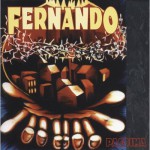 Rubberneck
Rubberneck
El Niño
Funkefeel Productions
It’s been over two years since the release of Rubberneck’s first Cd Nosotros— though you’d hardly know it from watching the local charts, where the album has consistently placed. And though there have been peripheral changes within the band since the last recording (the rhythm section has been replaced by drummer Brian Foxworth and only saxman John Morrow remains among the horn players) the essential core of the group: brothers Ricardo Ojeda on guitar and bassist Pablo Ojeda, Morrow and keyboardist deluxe Joey Porter, has remained in tact. And what you get is the sound of a rousing Funk band that really knows what it’s doing.
As with the predecessor, Rubberneck do a great job of mixing musical styles and themes, this time around adding a large dollop of Latin music to the stew. The band enlisted Santana conga man Raul Rekow and Ricardo Romero on congas and timbales to supplement several tracks. But beyond that, Rubberneck are still a Funk band at heart. Ricardo’s plucky chicken pickin’ and Porter’s always tasty selection of vintage keyboard sounds meld seemlessly with Pablo’s thumping basslines. These guys are true veterans and the energetic sound they create is the culmination of years of hard work. it would seem that the work is paying off in big dividends.
The party is on from the start, with “FSN,” a Morris Day meets Parliment sort of number, punctuated by the skittering horn lines of Morrow and trumpeter Mike Barber, Ricardo’s stylish fretwork and Porter’s masterful technique with an array of keyboards, most notably the Moog and Hohner Clavinet on this track. Vocally, the tune is driven by the imaginative use of a talkbox, which manipulates the voices in lots of interesteing ways; including, what sounds like chipmunk backup vox.
“Diga Me” rides on Porter’s Latin flavored piano and subtle organ flourishes, and a spirited horn section, as Ricardo delivers one of his characteristically soulful vocals. Morrow steps up with an inspired flute solo (of all things), before giving way to a wave of Latin percussion provided by Rekow and Romero. Porter lends Deodato-like Fender Rhodes tones to “”Call Me,” while Pablo’s bass rumbles beneath Blood, Sweat and Tearsish horn charts. Ricardo’s robust lead vocal is supported by strong gang background harmonies, at times reminiscent of Michael McDonald of the Doobie Brothers.
Latin flavors spice up “Todo Pa Ti.” Over Barber’s solitary trumpet Ricardo adds seductive Spanish guitar, as the band breaks into a very cool Santana meets Earth Wind and Fire groove, buoyed by Porter’s spot-on Salsa piano and dark organ phrasings. Here again Rekow and Romero add superb Latin percussion to Foxworth’s deft drumming, Ricardo’s husky baritone carries the verses and the choruses benefit from more smooth harmonies provided by the rest of the band. Ricardo contributes a fiery electric guitar solo to take the song out, ending with a perfectly executed exclamation.
Porter lays out nifty organ riffs and wah-wah doused Clavinet lines against staccato horns and Pablo’s loping bass on “Happi,” where a distinct Morris Day vocal approach creeps into the mix. Morrow moves to center stage during a sporty sax solo spot. “Completely,” another Latin number— on this occasion in an uptempo waltz, takes advantage of fine sputtering horn charts and authentic Mexicali group vocals.
The final four cuts, while maintaining a high level of Funk proficiency and having individual standout moments, fail to rise to the high standard of performance set forth in the previous eight. It’s as if the band ran out of ways to dress up and embellish the arrangements, preferring to just run through them, more or less in a manner that would constitute live renditions. Despite the fact that the band perseveres in upholding their energy and polish, the album seems to bog down toward the end.
But the secret track, “Smokin’,” a shameless paean to the bands’ shared appreciation for the bud, bubbles like a bong at a NORML benefit. Rapper Cappucino and platter grinder DJ Chill add a whole new dimension to the Funk, as the Rubberneckers again hit their stride with an over-the -top onslaught that is as comical as it is resourceful.
El Niño finds Rubberneck in top form, delivering the goods on most songs. Wisely, the band plays to its’ strength in the Funk and Latin categories: steadfast ensemble work with occasionally brilliant solos. The downside is that the arrangements have a sameness; which by album’s end a tend to create a certain inexorable tedium. The lyrics run from unmemorable to innocuous, which is about par for the course for Funk, but relegates the songs to background party music status at best.
Musically, Rubberneck have tightened up immeasurably, while heightening the focus, though they have yet to overcome their formulaic approach to songwriting. One is hardpressed to remember a solitary hookline, let alone even a single song. In order for the band to move to the national arena, they must address this shortcoming. Because they have a lot of things going for them otherwise, it is in their own best interest.
 Fernando
Fernando
Pacoima
Cravedog Records
Troubador Fernando Viciconte is said to have created a stir at SXSW recently, busking his way to notoriety. With this effort, wherein he aligns forces with brilliant newcomer Luther Russell, for what may very well be one of the top albums of the year, the pair achieve a supreme interfusion of Fernando’s Latino heritage with Luther’s unerringly brilliant production (which includes performing as the drummer, bassist, keyboardist, side-guitarist— and performing each task extremely well), bringing each song to life in an unique and bracingly unusual way.
The twelve songs are fairly evenly divided between flat out rockers and ballads. There’s an instrumental tune and a Richie Valen’s cover. Fernando sings all the songs in Spanish. And though an English translation is thoughtfully provided in the liner, Viciconte’s flawless vocal delivery supercedes all possible language barriers, speaking directly to the heart (or some other portion of the abdomen) with ease.
Not every song is a hit. There are occasional lapses, but the ratio favors Fernando’s knack for crafting catchy songs and Luthers ability for fleshing them out and assembling them in uncommon ways. When it all works, it really works.
“Oye Mamacita” is a steamy piece of Tex-Mex, with Luther’s thundering drums and chugging Farfisa churning out a Sir Douglas Quintet-like groove.
Fernando’s gritty tenor rides over the jagged undercurrent sounding like a lost Sixties gem. Similarily, “Alameda” could be the work Sam The Sham and The Pharohs with something to say. A halting guitar figure and an ethereal organ lay the foundation upon which Fernando builds a tough Rock stance.
“Peligro Del Brujo” finds Fernando mugging like a Latin James Brown, as Luther provides the funky guitar licks and guest Paul Brainard interjects choice trumpet hits. Very cool.
Brainard makes another appearance on trumpet in the moody instrumental “Pacoima.” Luther weaves a churchlike organ against a Morricone-like lowstring guitar line and Brainard’s romantic Spanish melody. “Chanchos Sucios” is pretty much a remake of “Oye Mamacita,” with the variation of a key change and a bridge thrown in to confuse the issue.
Among the ballads, the dreamy “Como Sueno” stands out. A Latin rhythm section sets down a familiarly seductive beat against Russell’s flutelike organ and Fernado’s dramatic acoustic guitar and almost Lennonesque vocals— Luther’s haunting piano hanging above the scene like stark icicles.
Closer to Dylan is “Wisemen,” which could pass for “Knockin’ On Heaven’s Door” period stuff. Luther’s authentic organ and lonely lapsteel help to fashion the atmosphere. “Para Ti” is a charming tune with Folky roots. A simple arrangement of drums, bass and guitar is augmented, first with Luther’s tremelo guitar crunches, then with his lovely panflute keyboard motif and Fernando’s heartfelt vocals- hearkening to Paul Simon’s “El Condor Pasa.”
What an engaging project! Viciconte and Russell each bring the best of themselves to the undertaking, never overstepping their own considerable abilities, but lending instead a sense of respectful exploration to the material.
Russell’s low-fi bedroom/basement recording technique does not detract from the proceedings, but rather imparts a sheen of authenticity; his keen musical sensibilities enhancing every aspect of the production. A stellar achievemnt.
 Pedro Luz
Pedro Luz
Ten Beautiful Luzers
Self-Produced
Seemingly the third in a trio of early celebrants of Latin Music month, in spite their monniker, Pedro Luz instead purvey a fairly bland and pedestrian form of Pop, with dumb, sort of early Lou Reed meets the Bristish invasion songs that tend to hang on a simple chord progression and go nowhere from there. Replete with phony British accents and detached, nasal delivery, every song seems like a faint notion of an idea in search of a chorus. Predictable, aimless, boring, adolescent drivel, with no sense of direction or motivation whatsoever.
Three of the ten numbers summon enough energy to attempt to “rock.” Of those, the stupid, Spanish-flavored “Zamboya” nearly rises to the level of mediocre. Of the soporific “ballads,” none muster enough verve to even qualify as listless, drowning under the weight of their own lack of inspiration and appallingly narrow world view. What a waste of time.
It’s a free country, anyone can make a CD, pass it out to their family and friends and call it good. But when they attempt to foist something off on an unsuspecting public, the whistle must be blown. There is far more to the composition of even the barest of songs than simply scrimping together some paltry guitar line and warbling nonsense for three minutes. Attempting to further delineate all that’s wrong with all this would be the criminal waste of ink and a tree.
 Flatland
Flatland
The Satellite
Origin Records
Bassist Donald Corey and drummer Todd Bishop, the rhythm section for Iron John, take a different tack altogether, joining forces with guitarist Matt Wayne for a session of inspired space Jazz pieces, impecably produced by Tony Lash. Here the band run through nine compositions, including “Mopti” and “Guinea” by Don Cherry and “Themes From Jack Johnson” by Miles Davis.
The trio have a democratic approach to the material, never getting in ezch others’ way, leaving plenty of space, while displaying technical virtuosity at every turn. Often times Corey starts things off with a piquant and brief bass solo, before things evolve. Wayne will then usually chime in with some challenging riffage that would seem to come in somewhere between the adroit complexity Pat Methany and the adventurousness of Talk Talk’s Mark Hollis. All the while Bishop interlaces a complex fabric of multi-rhythmic textures and rocksolid beats.
Some cuts, such as the title track, “Atari Effect” and “Good Grief” would seem to be excursions in controlled noise. But others, “The Different Lives We Lead,” “Invisible Generation” and the cover tunes are more precisely dilineated though hardly less prodigious nor daring. Corey is the catalyst creating nifty themes upon which Wayne deftly extemporizes, with lightening quick single note lines and full-bodied block chords.
There aren’t many bands playing instrumental music on the scene these days. Those that are tend to be of the Surf persuasion. Flatland are a rare breed of band, who blur the lines between Rock and Jazz, executing their intricate postulations with panache and aplomb. Like a musical martini, the band may be an aquired taste, but the effect is unmistakeable.
 Maureen Andrews
Maureen Andrews
Beatnik Boys
Self-Produced
Stylistic chameleon Maureen Andrews has been plying her craft upon the local scene far longer than she would probably care to admit. In that time she has fronted a new wave Rock band, gone solo as a singer/songwriter and eventually poked around the Country thang. She became something of a Caberet chanteuse and then went back to Country. Here we find her revisiting her singer/songwriter stance, adopting a style that incorporates a little of all the aforementioned; probably falling somewhere between the works of Shawn Colvin and Mary Chapin Carpenter.
Enlisting Marv Ross as producer and a bevy of local heavyweights to act as her backup band, Maureen sashays through a tight set of four of her own songs and five “cover” songs, including a Ross original, “Empty Train.” The production standard is quite high, certainly echoing latter-day Quarterflash in mettle and polish.
Not coincidently, several members of Quarterflash make appearances: Marv and Rindy participate on “Empty Train,” bassist Sandin Wilson steps in for a couple of songs and Gregg Williams drums most of the way through. Add generous input on most of the songs by bassist Michael Kearsey and guitarist extraordinaire Brad Price, and the scene is complete for a rousing set. Maureen and company deliver the goods.
The title track is a snappy number, propelled by Williams’ smart drumwork and Price’s wicked guitar solo. Maureen leads the way, her pleasant soprano lilting through intelligent verses and a catchy chorus. “Hands That Hold” is a Country tinged number, Price’s lonesome slide guitar and guest Mark Bosnian’ s subtle piano filigree’s help to create the mood, Julie Bonaduce’s sparkling harmony vocals turning the choruses to gold.
“Empty Train,” sprints upon Wilson’s breathless locomotive bass, as Williams and Price furnish nimble accents, while Marv chirps in on harmonica and Maureen adds the saucy vocal track. Rindy Ross joins in for the high harmonies at the turnarounds of an uptempo update of Stealers Wheel’s “Stuck In The Middle” (with a bridge reminiscent of the bridge in the Beatles’ “I Saw Her Standing There).
Maureen returns to her Patsy Cline incarnation with weepers such as her own “Crocodile Tears” and Mel Tillis’ “Strange.””The Party Next Door,” rooted in familiar Latin themes, is juiced up mightily by Gavin Bondy’s spectacular Tijuana Brassisms. A wisely chosen remake of the Hollies’ early hit “I Can’t Let Go” is a sprightly rendition, with Country acoutrements woven in by Skip Parente’s violin and Mark Simpson’s pedal steel guitar.
Maureen Andrews demonstrates that she has the vocal chops to handle nearly any musical curbeball, faltering only with the bluesy “Don’t Ever Leave Me Again” where her inherent wispiness fails to fulfill her desire to belt out the song. Otherwise, her performances are effective and affecting, indicative of her years spent fine-tuning her skills as a singer and a songwriter. It all comes together very nicely here.
 Arana
Arana
Living On A Few Acres
Self-Produced
An earnest young trio, Arana favor acoustic FolkPop similar in feel to stripped down versions of REM or the Dave Matthews Band. Though as yet not fully formulated, their sound clicks often enough to give way to a positive outlook for the band’s future.
Vocalist Jay Arana, apparently the raison d’etre, has a decent voice and a driving, rhythmic approach to the acoustic generally guitar. His songs are well-intentioned, if at times a bit awkward.
But”Voices” stands out. Beneath bassist Mike Rooney’s vibrant conga work, Sanchez Lovejoy sets up a skittering drum pattern as Arana unleashes a jangling acoustic profusion, capturing a spirit in the song that he doesn’t often find in his other songs. Very nice.
In other spots, such as on the jazzy “On the Level” or the typically chipper “Happy Roots,” Arana shows an aptitude for curiously appealing little guitar fills.
“Oddities”slides on Lovejoy’s The instrumental”Fillersyncopated crosstimes and Rooney’s rubbery basslines; Arana slithering between with a funky riff. The “secret track” even features an actual electric guitar and a strong vocal part on Arana’s part.
Arana, the band, aren’t going to blow anybody away with their “wall of sound,” but neither will they offend with their understsated approach. If Arana should choose to develop his songwriting ablities by seeking out ways to become more melodically intrepid; strengthening his abilities to construct memorable choruses— steering clear of clichés and the obvious, there is reason to believe he might one day succeed at his vocation.
